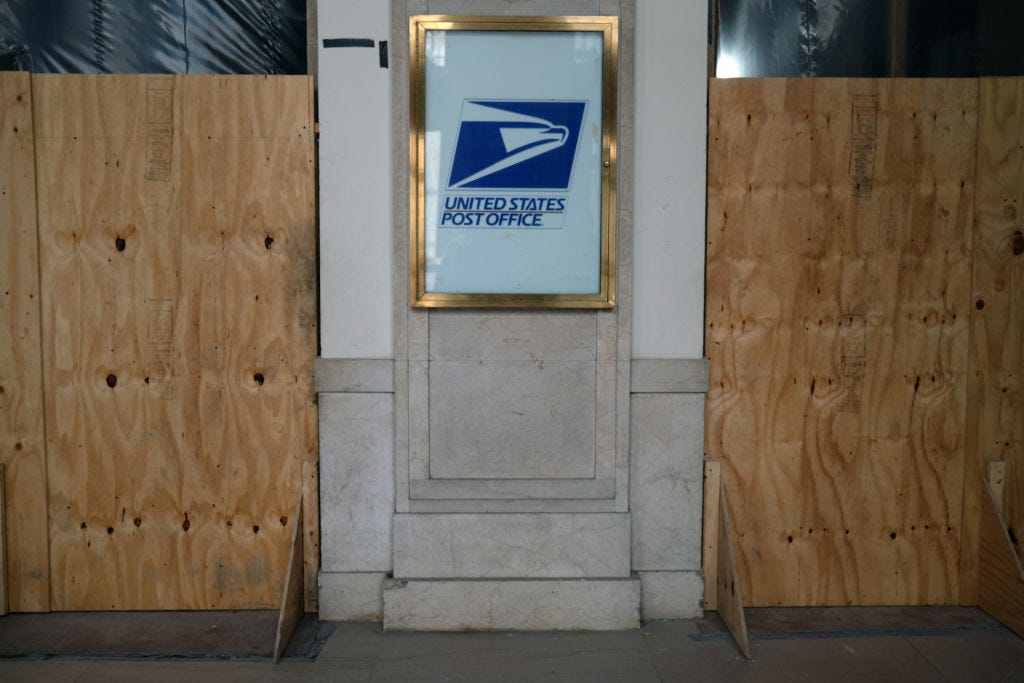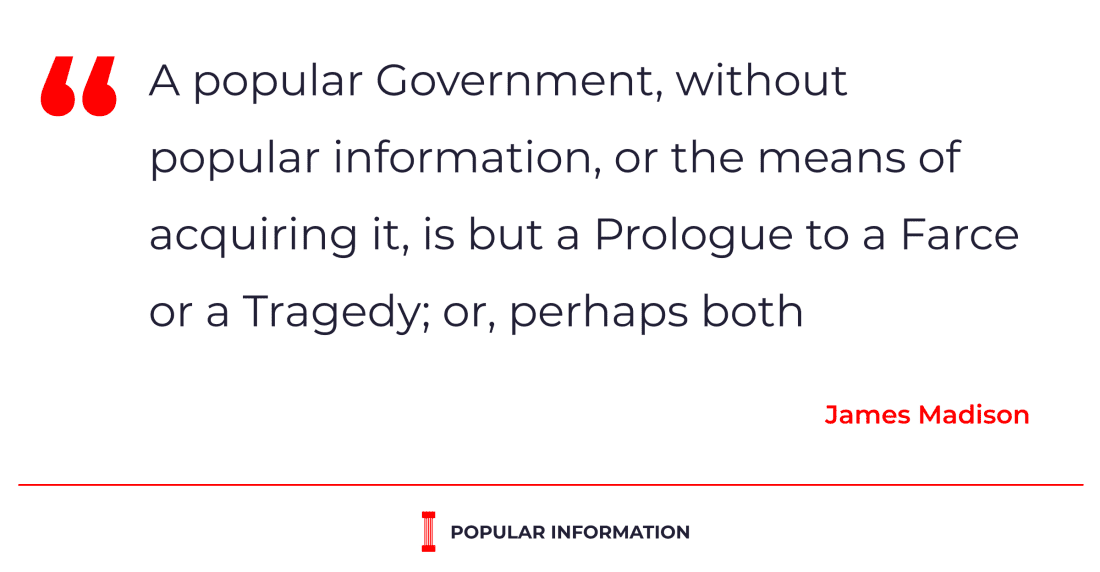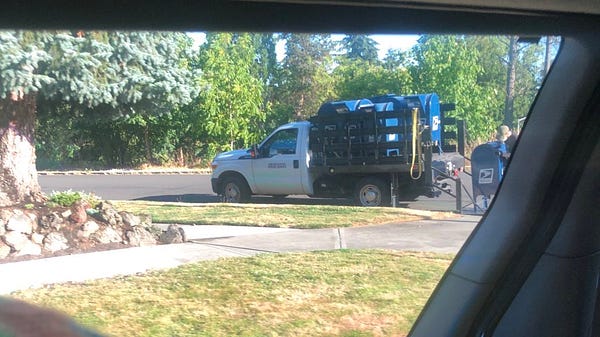 |
Photo by Spencer Platt/Getty Images
Forty percent of all votes in the 2016 election were cast by mail-in ballot. That's 57.2 million votes. Trump raised no objections at the time. Instead, he falsely claimed that 3 million undocumented immigrants voted, robbing him of a popular vote victory over Hillary Clinton. In subsequent elections, Trump cast his own vote by mail.
It wasn't until April of this year, as the pandemic made in-person voting potentially dangerous for many people, did Trump begin to falsely claim the mail-in voting was vulnerable to fraud.
Less than a month later, the United States Postal Service Board of Governors installed Louis DeJoy, a Republican fundraiser and political operative, as Postmaster General. Before becoming Postmaster General, Trump had tapped DeJoy to be the finance chairman for the Republican National Convention. DeJoy has donated "more than $650,000 to the Trump Victory Fund and more than $1 million to the RNC," including a $210,600 donation to the Trump Victory Fund on February 19.
After DeJoy's appointment, Trump intensified his false attacks on mail-in voting. Claiming on May 24, without evidence, that allowing people to vote by mail would result in the "greatest Rigged Election in history."
On May 26, as Trump's mishandling of the pandemic depressed his polling numbers, Trump claimed all mail-in ballots would be "substantially fraudulent." Trump claimed, again without evidence, that "mail boxes [sic] will be robbed, ballots will be forged & even illegally printed out & fraudulently signed."
Up until this point, it was just bluster by Trump. But a few weeks later, DeJoy began ordered dramatic changes to slow down mail delivery and make it more difficult for voters to receive and return mail-in ballots on time. DeJoy cut hours and eliminated overtime. An internal memo instructed USPS workers to leave "mail on the workroom floor."
But that was the tip of the iceberg. In advance of a general election during a pandemic, DeJoy is systematically undermining the capacity of the USPS to deliver the mail on time. According to reports, DeJoy is "in frequent contact with top Republican Party officials" and "met with the president in the Oval Office" this month.
Sorting it out
In June, The USPS began "removing mail sorting machines from facilities around the country without any official explanation or reason." According to documents obtained by CNN, it's part of a plan to decommission 671 machines in cities around the country this year. Postal workers say the machines "have been dismantled and that it wasn't immediately clear what the agency was doing with the parts." The machines were slated to be removed before the end of September.
Sorting machines are what allow the postal service to process large volumes of mail. A machine with two operators has "the capacity to sort up to 30,000 mail items" daily. It would take 30 postal workers to sort the same amount of mail by hand.
The plan, if fully implemented, would eliminate 10% of the processing capacity of the USPS. The 671 machines "have the capacity to sort 21.4 million pieces of paper mail per hour." Many of the machines scheduled to be removed are located in the cities and states that are expected to determine the winner of the election, including "24 delivery bar code sorters in Ohio, 11 in Detroit, 11 in Florida, nine in Wisconsin, eight in Philadelphia and five in Arizona."
“I’m not sure you’re going to find an answer for why [the machines being removed] makes sense because we haven’t figured that out either,” Iowa Postal Workers Union President Kimberly Karol told Vice.
Boxed in
The USPS has also been removing some of its signature blue mailboxes and hauling them away in flatbed trucks. Two Oregon cities, Eugene and Portland, are seeing mailboxes removed.
In Montana, mailboxes were being removed in the cities of "Billings, Bozeman, Missoula and Lewistown." But the state's two senators, Steve Daines (R-MT) and Jon Tester (D-MT), objected, and the plans were put on hold. “I’m glad the USPS acted swiftly upon my request and halted any further removal of collection boxes,” Daines said.
It's unclear how many mailboxes have been removed. But after widespread public criticism, the USPS announced Friday night that it would not remove any more until after the election.
A first-class problem
Typically, no matter how ballots are sent, the USPS workers prioritize their delivery. To save money, many states have paid the third-class rate, which is 20 cents, for ballots. But traditionally, the ballots are still treated like first-class mail.
But, in recent weeks, "USPS General Counsel Thomas Marshall informed state leaders that, depending on their respective deadlines for requesting an absentee ballot and casting a vote by mail, sending election items third class may cause voters to miss crucial cutoff points."
In other words, Marshall is suggesting that ballots would no longer be prioritized. If the USPS follows through on this threat, ballots sent at the third-class rate will take three to 10 days to be delivered rather than the two to five days for first-class mail.
This puts states in a bind. The first-class rate is 55 cents, which would nearly triple the costs of mailing and returning ballots. Many states are already struggling with gaping budget gaps due to the economic impact of the pandemic. And, unlike the federal government, many states are not able to run a deficit to absorb the costs.
An ominous warning
As outrage over the changes at the USPS has grown, DeJoy has insisted that there is nothing to worry about. He says he is simply imposing "discipline" within the postal service. But the changes, DeJoy said in a letter to USPS workers last week, will not impact the USPS' ability to deliver ballots. Instead, DeJoy claims, it "will increase our performance for the election."
DeJoy's assurances, however, are contradicted by what the USPS is telling states. Citing the anticipated volume of mail-in ballots, the USPS "recently sent detailed letters to 46 states and D.C. warning that it cannot guarantee all ballots cast by mail for the November election will arrive in time to be counted." The letters, sent to states at the end of July, warned that "[e]ven if people follow all of their state’s election rules, the pace of Postal Service delivery may disqualify their votes."
Officials, including those in the swing states of Michigan, Pennsylvania, and Florida, were warned that "that their long-standing deadlines for requesting, returning or counting ballots were “incongruous” with mail service and that voters who send ballots in close to those deadlines may become disenfranchised."
Pennsylvania responded by implementing a new policy that would count votes received up to three days after the election. But a court in Michigan ruled that it is too late to change its deadline. And many states will be unwilling or unable to change their procedures.
DeJoy called to Congress
On Sunday, the House Oversight Committee "invited Postmaster General Louis DeJoy to testify at an urgent hearing on Monday, August 24, 2020." The hearing will scrutinize DeJoy's "sweeping operational and organizational changes at the Postal Service, which experts warn could degrade delivery standards, slow the mail, and potentially impair the rights of eligible Americans to cast their votes through the mail." The House has also imposed an August 21 deadline for DeJoy to produce documents related to those changes.
Some are arguing for a more aggressive approach. Congressman Jim Cooper (D-TN), generally regarded as one of the most conservative members of the Democratic caucus, is calling for DeJoy to be subpoenaed to testify. If DeJoy doesn't comply, Cooper says, the House should dispatch the Sergeant at Arms and detain him until he cooperates.
Congress, of course, can do more than hold hearings. It could pass legislation to improve the handling of election mail. Congress could, for example, mandate that all ballots be treated as first-class mail and provide funding for whatever overtime is needed to process the ballots.
But funding for the USPS is stalled along with the broader coronavirus relief package. Trump, for his part, seems to be content with that. "They need that money in order to have the post office work so it can take all of these millions and millions of ballots. If they don’t get those two items, that means you can’t have universal mail-in voting because they’re not equipped to have it," Trump said in an interview on Fox Business.
If you value this work, please help spread the word! The bigger we grow the Popular Information community, the bigger our impact.
Click HERE for your unique referral link. As your friends and family sign up, you'll earn Popular Information merchandise and invitations to special events.
You can learn more about the impact this newsletter has had this year here.
 |





